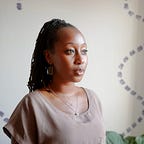Paris for Ferguson
by Shola Adisa-Farrar
When Trayon Martin was killed I wrote a song. When the grand jury decided that the police officer who killed Michael Brown would not be indicted my eyes filled with salty tears. When the refrain repeated a week later this time with clear video evidence of Eric Gardner’s unjust murder at the hand of another police officer, I heard silence. The goose bumps that normally mark my body when tragedy strikes, had vanished. My body felt numb and I was rendered dumb…founded!
And this time, I didn’t wanna sing about it, I didn’t wanna think about it, I was too exhausted to identify and analyze my feelings. Enough is enough. Apology not accepted. Pardon not granted.
These deaths could have all been avoided, and the fact that-irrespective of the situation-they were at the hands of those who are inducted into a position to serve and protect, is even more alarming. Worse than the continual throwing of the salt on the wound, I live over 3,500 miles away from a community of people who can identify with the range of emotions I have been experiencing; primarily numbing sadness and deep rage.
Last Saturday, admittedly, I was ambivalent about participating in the organized Paris to Ferguson Protest, wondering if my voice or presence made a difference. I debated whether a protest was still a relevant or effective method to combat this type of injustice. But I spoke with a close friend, also a Black American living in Paris, and she encouraged me to support this call to protest on an international stage.
Saturday December 6th
I showed up 45 minutes after the protest was said to begin and I was impressed by the placement of the group… effectively blocking the swoon worthy views of the Eiffel Tower that tourists make the trip to admire. I was excited by the diversity of signage and people who were there with something to say. As I listened to the various speakers I was pleased to hear the range of opinions, experiences and languages, many of which coincided with mine. The program shifted comfortably between French and English. The chants: “Black Lives Matter” and the call and response of “Hands Up, Don’t shoot” pierced the cold air.
One thing I am sure of is we, as Americans, can not continue to live like this. However, how can we affect lasting change and help insure that Black people feel as though our lives matter in a hostile environment where our human rights and equality have always been questioned and threatened?
